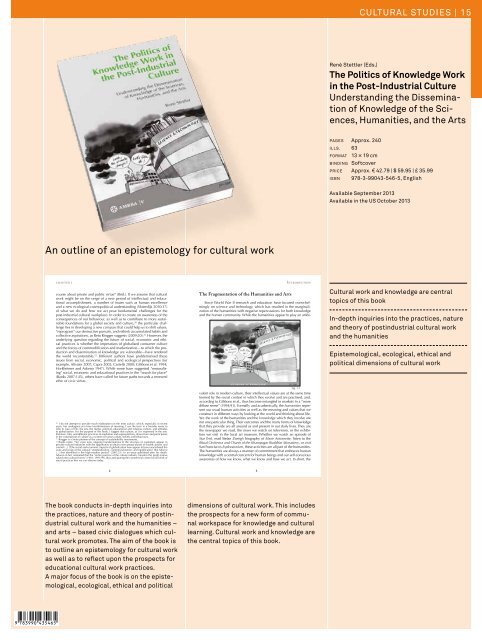Architecture, Art & Culture - Ambra Verlag
Architecture, Art & Culture - Ambra Verlag
Architecture, Art & Culture - Ambra Verlag
You also want an ePaper? Increase the reach of your titles
YUMPU automatically turns print PDFs into web optimized ePapers that Google loves.
Cultural Studies | 15<br />
René Stettler (Eds.)<br />
The Politics of Knowledge Work<br />
in the Post-Industrial <strong>Culture</strong><br />
Understanding the Dissemination<br />
of Knowledge of the Sciences,<br />
Humanities, and the <strong>Art</strong>s<br />
Pages Approx. 240<br />
Ills. 63<br />
Format 13 × 19 cm<br />
Binding Softcover<br />
Price Approx. € 42.79 | $ 59.95 | £ 35.99<br />
ISBN 978-3-99043-546-5, English<br />
Available September 2013<br />
Available in the US October 2013<br />
An outline of an epistemology for cultural work<br />
chapter i<br />
course about private and public virtue” (Ibid.). If we assume that cultural<br />
work might be on the verge of a new period of intellectual and educational<br />
accomplishment, a number of issues such as human excellence<br />
and a new ecological-cosmopolitical understanding (Sloterdijk 2010:37)<br />
of what we do and how we act pose fundamental challenges for the<br />
post-industrial cultural workplace. In order to create an awareness of the<br />
consequences of our behaviour, as well as to contribute to more sustainable<br />
foundations for a global society and culture, 20 the particular challenge<br />
lies in developing a new compass that could help us to shift values,<br />
“reprogram” our destructive pursuits, and rethink accumulated habits and<br />
collective aspirations, as Reto Ringger suggests (2009:20). 21 However, the<br />
underlying question regarding the future of social, economic and ethical<br />
practices is whether the imperatives of globalised consumer culture<br />
and the forces of commodification and marketization—to which the production<br />
and dissemination of knowledge are vulnerable—have rendered<br />
the world incontestable. 22 Different authors have problematised these<br />
issues from social, economic, political and ecological perspectives (for<br />
example, Altvater 2007; Capra 2002; Castells 2000; Gibbons et al. 1994;<br />
Horkheimer and Adorno 1947). While some have suggested “remoralising”<br />
social, economic and educational practices in the “search for place”<br />
(Banks 2007:145), others have called for future paths towards a renewed<br />
ethic of civic virtue.<br />
20 I do not attempt to provide much elaboration on the term culture, which, especially in recent<br />
years, has undergone yet more transformations of meaning. I use the term in a broader sense to<br />
refer to ways of life, the arts, the media, political, educational and religious culture, and attitudes<br />
to globalization. For the purpose of this book, I suggest that culture, as it is expressed in the arts,<br />
literature, film, and different practices of mediation and representation, draws from and participates<br />
in the construction of culture as a system of human values, beliefs and behaviours.<br />
21 Ringger is a Swiss pioneer of the concept of sustainability investments.<br />
22 Banks notes: “Yet, even now, ongoing transformations in the structure of capitalism appear to<br />
provide cultural industries with the opportunity to obtain even greater shares of wealth, power, and<br />
control (...) [T]he social and economic impacts of globalization now appear to have exacerbated the<br />
scale and scope of the cultural ‘standardization, commercialization, and rigidification’ that Adorno<br />
(...) first identified in the high-modern period” (2007:25). In an essay published after his death,<br />
Adorno in fact reiterated that the “entire practice of the culture industry transfers the profit motive<br />
naked onto cultural forms” (1981; 1991:99), thus anticipating the commercial control of all kinds of<br />
social practices that we can observe today.<br />
The Fragmentation of the Humanities and <strong>Art</strong>s<br />
Introduction<br />
Since World War II research and education have focused overwhelmingly<br />
on science and technology, which has resulted in the marginalization<br />
of the humanities with negative repercussions for both knowledge<br />
and the human community. While the humanities appear to play an ambi-<br />
Fig. 1.1<br />
valent role in modern culture, their intellectual values are at the same time<br />
formed by the social context in which they evolve and are practised, and,<br />
according to Gibbons et al., thus become entangled in markets in a “more<br />
diffuse sense” (1994:91). Formally and academically, the humanities represent<br />
our usual human activities as well as the meaning and values that we<br />
construct in different ways by looking at the world and thinking about life.<br />
Yet, the work of the humanities and the knowledge which they involve are<br />
not one particular thing. Their outcomes and the many forms of knowledge<br />
that they provide are all around us and present in our daily lives. They are<br />
the newspaper we read, the news we watch on television, or the exhibition<br />
we visit in the local art museum. Whether we watch an episode of<br />
Star Trek, read Stefan Zweig’s biography of Marie Antoinette, listen to the<br />
Ritual Orchestra and Chants of the Khampagar Buddhist Monastery, or visit<br />
San Francisco’s Exploratorium, these activities are all part of the humanities.<br />
The humanities are always a manner of commitment that embraces human<br />
knowledge with a central concern for human beings and our self-conscious<br />
awareness of how we know, what we know and how we act. In short, the<br />
Cultural work and knowledge are central<br />
topics of this book<br />
In-depth inquiries into the practices, nature<br />
and theory of postindustrial cultural work<br />
and the humanities<br />
Epistemological, ecological, ethical and<br />
political dimensions of cultural work<br />
2 3<br />
The book conducts in-depth inquiries into<br />
the practices, nature and theory of postindustrial<br />
cultural work and the humanities –<br />
and arts – based civic dialogues which cultural<br />
work promotes. The aim of the book is<br />
to outline an epistemology for cultural work<br />
as well as to reflect upon the prospects for<br />
educational cultural work practices.<br />
A major focus of the book is on the epistemological,<br />
ecological, ethical and political<br />
dimensions of cultural work. This includes<br />
the prospects for a new form of communal<br />
workspace for knowledge and cultural<br />
learning. Cultural work and knowledge are<br />
the central topics of this book.



